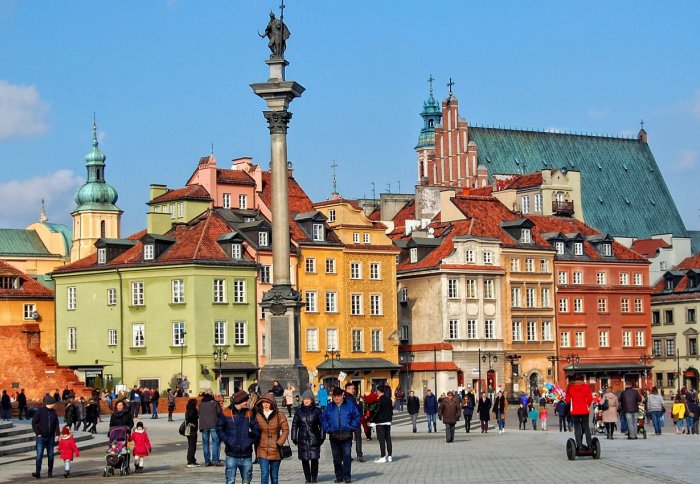Europeans to become online heritage curators
by Colin Smith

Warsaw Old Town, Poland.
A new Facebook-like social platform and smartphone apps will be developed by researchers to enable people to document Europe's cultural heritage.
The PLUGGY tools will be designed to solely focus on a niche area in social media - celebrating Europe’s collective heritage.
– Dr Lorenzo Picinali
Dyson School of Design Engineering
The new €2.5 million European consortium involves academics from Imperial’s Dyson School for Design Engineering and a further nine partner organisations from Greece, Italy, Slovakia, Spain and the UK. The aim of the three-year project is to develop a suite of smartphone tools that will enable individuals, community groups, industry, museums and countries as a whole to document and share their heritage online.
The smartphone tools that users will be able to download and use for free will include an augmented reality application that will enable people to build virtual models of important local heritage. These will be overlaid with information uploaded by the user, and shared with others via the Facebook-like social media platform, so that others can learn more about cultural heritage points of interest across Europe.
Another is called the Geological Mobile app, which will enable users, who will act as curators of their local heritage, to showcase geographical information that may have cultural significance, which will be shared online with others. When activated on a smartphone, users visiting other regions or countries will be notified by the app about nearby interesting ‘encounters’ that are targeted to their outdoor activities.
The 3D Sonic Narratives app will enable users to create audio packages that they can upload onto the social media platform. It will have advanced 3D acoustic recording technology so that users can record realistic audio soundscapes of local attractions such as the ringing of bells at a church that has heritage value.
The final app, called the Collaborative Game app, will enable users anywhere across Europe to work together to compose a comprehensive narrative around particular cultural heritage topics. Topics could be based on anything, from the de-industrialisation of local areas and their impact on locals in the community, to the rise of modern architecture in urban environments, and the preservation work that groups are undertaking to save local landmarks.
European collaboration
The idea for the collaboration, which is funded via Horizon 2020, stems from the Framework Convention on the Value of Cultural Heritage for Society, known as the Faro Convention. In October 2005, member countries of the European Union including the UK signed the agreement, which emphasised the importance of Europe’s cultural heritage as a common and valuable resource. The aim was to create a framework that would show what kind of economic, social and cultural possibilities and resources cultural heritage can offer. This new European collaboration called ‘PLUGGY’ (Pluggable Social Platform for Heritage Awareness and Participation) may enable citizens across Europe to further realise the ambitions of the Faro Convention, enabling a greater sharing of, and access to, Europe’s vast and diverse cultural heritage.
Dr Lorenzo Picinali and Dr James Mackrill from Imperial’s Dyson School of Design Engineering, are co-leading on the College’s contribution to this project. They believe that when the technology is developed and rolled-out across Europe it could have a major impact on the way Europeans collect, store and curate our combined cultural heritage.
Dr Picinali said: “No one is disputing the importance of existing social media platforms for sharing useful information globally. However, they are designed to be multifunctional, serving many purposes for users. We hope that the PLUGGY collaboration will provide a useful and interactive suite of tools that won’t compete with current technology, rather it will complement it. The PLUGGY tools will be designed to solely focus on a niche area in social media - celebrating Europe’s collective heritage. The development of this technology has the potential to generate new interests in forgotten heritage, unearth new cultural gems for people to go and explore, or even celebrate things that people haven’t even considered as important parts of our heritage.
“We are so excited to be part of this new European project, which demonstrates the importance of ongoing collaborations to enhance our shared future.”
Dr Jamie Mackrill added: “All European countries have a huge wealth of cultural heritage that need to be regularly documented for future generations. However, this can be a struggle for some countries with stretched budgets and less advanced technologies. On a local scale, many groups and individuals are busy collecting and archiving valuable information, but don’t have the adequate means to share it with other like-minded enthusiasts. We think PLUGGY could provide a valuable online tool at both ends of the spectrum.”
Article text (excluding photos or graphics) © Imperial College London.
Photos and graphics subject to third party copyright used with permission or © Imperial College London.
Reporter
Colin Smith
Communications and Public Affairs